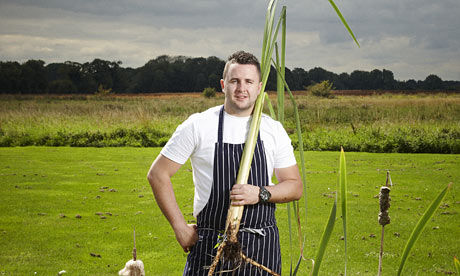
We have barely stepped outside the door of the hotel in Suffolk where he cooks when Paul Foster practically drops to his knees and starts stroking the lawn. "Yarrow," he says. "Lovely stuff. Has a kind of lavender flavour." He jumps up and leads the way down to the nearby river. Beyond is the water meadow, the source of the ground ivy, the sorrel-like daisy leaves, the mugwort, hogweed and ribwort plantain that he uses in his cooking. "The ribwort has a terrible texture," he says. "But you can use it for infusions and it has this amazing mushroomy flavour, like ceps." As well I know: he's just served me a gloriously rich velouté flavoured with it, around an egg, slow-cooked at 62C into an unctuous gel.
Foster, only just 29, would be the first to admit that there is little in his background to suggest he would become this kind of chef, cooking cutting-edge food flavoured with ingredients foraged from outside his front door at the Tuddenham Mill boutique hotel. True, his parents were in the pub business and his mother cooked the food from scratch – "standard pub grub, really" – but those pubs were in the concrete heart of Coventry, a long way from anything green that you might wish to eat. "I knew from early on that I wanted to cook. As a kid I used to bake Victoria sponges, which I sold to the bouncers at the pub."
His journey from there was unexceptional: catering college, stints at local hotels in and around his home town, the best part of a year at Raymond Blanc's Le Manoir which he describes "as very hard. When you can cope with that you can cope with anything". Well, almost anything. He later helped launch a new restaurant back in Coventry which didn't work. "We were trying to impress Coventry and Coventry was never going to be impressed. I think we were just a bit too young."
The turning point, he says, came with winning an award that carried with it enough money to enable him to take unpaid work experience at Thomas Keller's French Laundry in California, regarded as one of the best restaurants in America. "The chefs were writing menus around what was available on their own farm. That had a big impact upon me." Another stint at the avowedly modernist WD-50 in New York gave him an insight into the possibilities of new technology.
But it was his two years at Sat Bains's eponymous restaurant in Nottingham that truly shaped him. It was there, Foster says, that he first got a sense of the potential of foraged ingredients. "We all know about elderflower and stinging nettles and things like that, but working there everything opened up." Not that it was all fun and games. "Sat is a tough guy to work for, but very good. He pushes his chefs to be creative." Sat returns the compliment. "Paul's a very talented chef. The food he cooks is very modern, but with evidence of his travels. He's using the landscape where he is, combined with modern techniques while always keeping the emphasis on flavour."
In March 2010 he answered the call from Tuddenham Mill, which was looking to update its rustic menu. "The management were always behind what I wanted to do, even when we were alienating the locals." On Saturday nights, they used to serve 30 plates of steak and chips; with Foster's arrival that all changed.
Across an extraordinary lunch, eaten at the pass in the kitchen, I am served a powerful pea mousse, with raw peas and torn leaves of water mint. There's roasted cauliflower with a silky cauliflower purée, candied hazelnuts and a sprinkling of chickweed from the meadow. There's that wobbly egg in its pond of something intense and mushroomy, courtesy of the ribwort plantain. There's duck with duck hearts, mackerel with the last of the summer's tomatoes, and textures of chocolate with semi-dried blueberries and a sweet, musty mugwort tea. This is certainly ambitious food but the cooking never loses site of the imperative of big clean flavours.
Most dishes are built around just two or three ingredients, save for one, an intricate grouse extravaganza. I watch him plate up: first a deep green purée of watercress from the riverbank at the back, dribbled across the plate, Jackson Pollock-style, plus some fresh watercress leaves. There's an intense onion fondue and a sprinkling of sweet-sour elderberries, all of which plays catch with the gamey bird. Best of all is a Kilner jar of outrageous mashed potato flavoured with a roasted onion powder, topped with the braised grouse leg, shards of crisp bacon, grouse sauce and puffed wild rice. "It's a lot of different things all of which have been treated simply."
Where, I ask him, does the foraging fit into all this? "It's not a gimmick," he says. "It's because you can see it all from the restaurant window." In short, he says, it would be madness not to do it.
As to the future, he would one day like his own place, somewhere back towards Coventry. "But not yet. I want to achieve more here." He grins. "I want to make my mistakes as an employee." Meanwhile, he has a wedding to plan – to Rhiain, whom he first met at primary school when he was 10. He has their dog to take for walks in the countryside he has come to love. He has ingredients to sniff out on the riverbanks and lunch to cook.
paulfosterchef.com; tuddenhammill.co.uk

